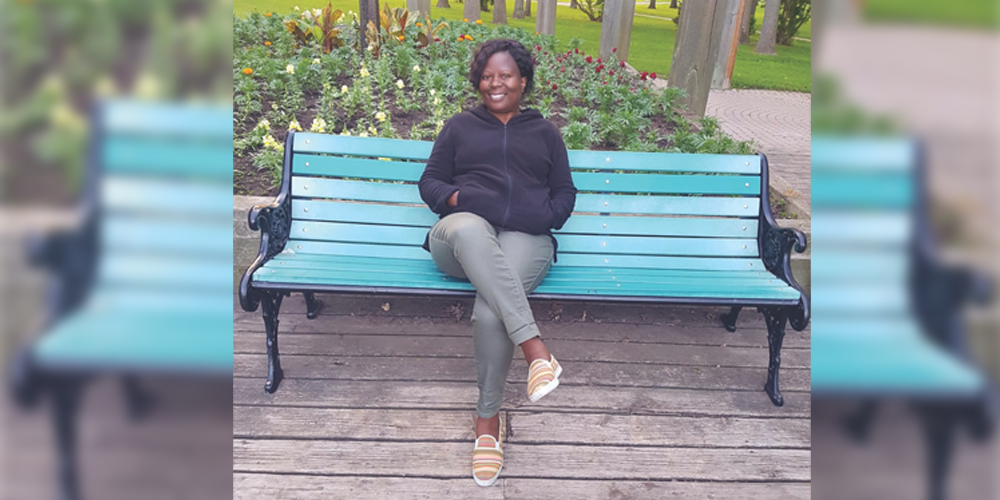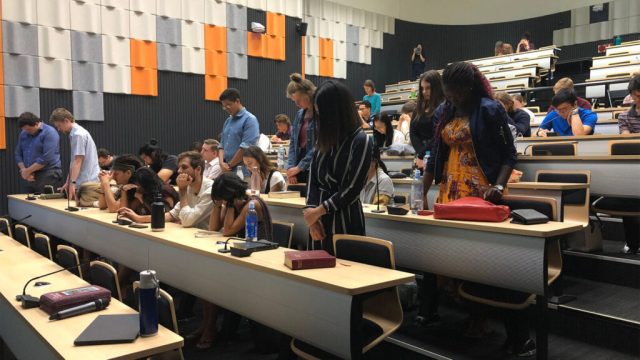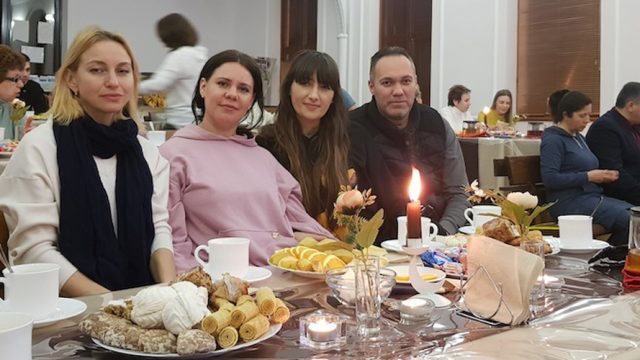Nella Mwamuka is enduring frigid cold to bring warmth to the Canadian north.

Her heart nearly springs out of her chest. Her eyes dart left and right through the obsidian darkness as her fingers desperately search for the source of the obnoxious ringing. The numbers on the screen are barely visible, as though she is looking through a foggy window. She sits up and slowly rubs her eyes, demanding them to focus. The time is now 5:40 a.m.
The soft, luminous glow from her “white honey wildflower” scented candle casts small dancing shadows across the off-white walls. The sweet aroma quickly envelops the room, creating an atmosphere of warmth and comfort, while Nella Mwamuka gets dressed for her sixth 12-hour shift of the week. With nine minutes and 58 seconds left, the countdown has begun. Mwamuka hops around the room, frantically putting on her thermal pants. Layer one is complete. Only two more to go. Next come her favorite navy-blue scrubs, followed by matching snow pants, a gray jacket, hat, gloves, ski mask, and goggles. Her shoulders slump, and she allows her body to gently sink into the mattress one last time while she slowly inhales the memories from home.
“It gets really lonely out here,” Mwamuka says. “So, the days I am feeling depressed, I would burn my little candle, so my room smells good, something to remind me of home.” It has been almost four months since Mwamuka’s last reunion with her friends and family.
Mwamuka works as a nurse in the small community of Igloolik in the Qikiqtaaluk Region of Nunavut, in northern Canada. She has been serving the Inuit community since March 2020. She works four months at a time, returning home for one month before going back to her service. Saying goodbye to her husband and friends gets harder and harder each time. Traveling far away from home requires a great amount of courage and strength. Working as a full-time nurse is tiring, and each day presents its own package of sorrows, challenges, and frustrations. Yet God never fails to deliver healing, peace, and comfort anew each day.
“My job here has changed me as a Christian,” Mwamuka says, raising her voice with confidence. “I tell God to help me because I can’t do this, and I actually see God working.”
At exactly 6:55 a.m., the obnoxious ringing pierces the silence once again. It’s time. Her fingers curl around the edges of the doorknob, and she squeezes her eyes shut in anticipation. That’s when it hits. The icy wind causes the animal fur lining her hood to lean back in defeat. The snow looks like a never-ending white cloud beneath the glow of the streetlights. The mountains standing over the frozen lake are barely visible through the darkness.
Mwamuka must dig her way through the snow as she passes numerous dark oak wooden houses placed on metal stilts. In a week’s time, these houses will be filled with family, friends, food, and Christmas cheer.
“The Inuit Christmas traditions are very similar to the western lifestyle,” Mwamuka says. “They decorate the inside of their house, have a family dinner, and participate in gift-giving. The main difference is the food.”

Christmas Day is a national statutory holiday, and it is observed in Nunavut. Some Inuit families store up food for months in preparation for Christmas Day. Elders, parents, children, and other community members gather to enjoy large portions of raw seal, fish, caribou, and muktuk (whale). Nunavut does not have any trees for firewood, so the Inuit ancestors ate their food uncooked. This is a tradition that has been passed down through generations.
Some Inuit of today, like their ancestors, celebrate a winter festival called Quviasukvik. The festivities start on December 24 and end around the second week of January. This is considered the beginning of a new year. In the past, community members would gather to build an igloo big enough to fit everyone inside. The head elder would then say a prayer to ward off any evil spirits in the upcoming year. After the ceremony, each family would bring food, and the community had a feast. The traditions have changed since residential schools forced a form of Christianity upon the Inuit community, however. As a result, the igloo is replaced with houses, and the new year’s prayer is substituted with a Christian blessing.
Sadly, other changes brought various problems.Due to the forced relocation of almost every Inuit community, Christmas Day rooms are often extremely overcrowded, and families are forced to sit on the floor. This problem is systemic and extends far beyond the holiday season, affecting their daily lives. It is not uncommon for a two-bedroom residence to house up to 11 people or more. Families live close together in houses that are often deemed unlivable due to mold and other structural issues.
Despite their struggles, the Inuit are a remarkably strong and resilient community. They know how to adapt and find joy in friends and family amidst their daily hardships. Looking around the room, one sees children playing, parents dancing, and elders eating. All current issues are forgotten as the holiday season evokes a sense of love, peace, and unity among community members.
At 7:30 a.m., Mwamuka enters the long-term care facility and searches for the outgoing nurse to get her daily report. The corners of her mouth turn upwards, causing her eyes to squint and form little friendly creases. The rectangular ceiling lights reflect off the floor as her shoes squeak down the hallway. Her steps are slow but purposeful as she briefly lingers beside each patient to uplift them in prayer. She quietly hums to herself as she assesses all 10 of her patients.
“I just live my Christian faith,” Mwamuka says. “My co-workers would ask why I’m so happy or why I don’t curse. That is when I tell them about God.”
There aren’t many Seventh-day Adventist churches in the territory of Nunavut. Although the Seventh-day Adventist Church has had active workers in Nunavut, it is hard for new converts to sustain their faith when they don’t have a place to congregate and ask further questions. There are Nunavut residents who earnestly desire the love, comfort, and reassurance that can only be found in God. However, their previous negative experiences with Christianity have skewed their perception of Jesus.
“A lot of my co-workers have come and told me their prayer requests, and when they are depressed, I pray with them,” Mwamuka says.
Mwamuka recalls her first work encounter with a Seventh-day Adventist believer. She remembers how the woman’s face lit up when she realized they shared the same beliefs. But the woman’s joy was quickly followed by shame as she looked at the floor and pronounced herself unworthy of God’s love because of her smoking habit. The light quickly returned to her eyes when Mwamuka explained God’s grace and compassion. Mwamuka took the time to answer all her questions and promised to stay in touch.
“Maybe we are going to meet down the road, and she will tell me, ‘Remember when you prayed with me and that made a difference?’ ” Mwamuka says.
At 4:30 p.m., Mwamuka sinks into a brown leather chair until her feet are slightly lifted off the ground. For the first time today, she can sit down and start her university assignments. There isn’t much time. It won’t be long before she must return to her patients. Her eyelids drop like a heavy curtain, and her body flinches as she forces herself to stay awake. Her body has not gotten a break in two weeks. The nursing home is short-staffed, and her help is desperately needed.
The territory of Nunavut is constantly suffering from a shortage of medical staff. It’s not uncommon for medical centers to close their doors when there aren’t enough staff available. The COVID-19 pandemic has amplified the problem, and nursing staff try their best to compensate by working long hours for multiple weeks in a row.
“I would love to work fewer hours, but I’m passionate, and I love what I do,” Mwamuka says. “This experience has made me stronger, because when things get tough, I go on my knees.”
Mwamuka slightly points her toes as she slowly steps into her favorite navy-blue snow pants paired with a black coat lined with animal fur. With slow and steady steps, she lingers by each patient’s bed one last time to say goodbye and offer prayers.
The countdown begins: one minute and 30 seconds left. After a last look over her shoulder, she takes a deep breath and steps into the still night air. Guided by the pale-yellow streetlights, Mwamuka walks past the houses on metal stilts, the frozen lake, and the mountains towering above. Her thoughts reflect on all the people she has encountered that day. She hopes God’s love radiated through her this Christmas season.
“It’s all about planting seeds. I may not see the end-product, and I may not see the difference I’m making. I just plant the seeds. God is going to water it one day,” Mwamuka says.
The alarm on her phone rings one last time. The time is 7:45 p.m. Work is done.
The original version of this story was posted in the December 2021 issue of Canadian Adventist Messenger.








